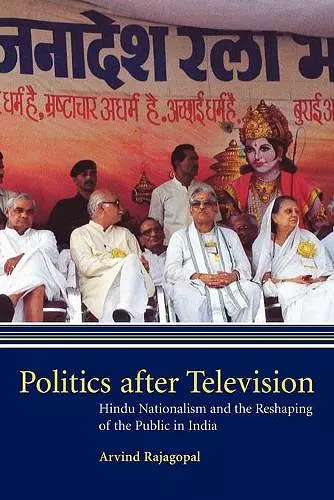Politics after Television
Hindu Nationalism and the Reshaping of the Public in India
Format:Paperback
Publisher:Cambridge University Press
Published:25th Jan '01
Currently unavailable, and unfortunately no date known when it will be back
This paperback is available in another edition too:
- Hardback£105.00(9780521640534)

An analysis of the use of media by political and religious interest groups in India
The broadcast on Indian national television in January 1987 of the Hindu epic The Ramayana sparked the largest political campaign in post-independence times, led by Hindu nationalists. Arvind Rajagopal's book analyses this extraordinary series of events. This book will interest scholars of politics, sociology, religion, media, and South Asian studies.In January 1987, the Indian state-run television began broadcasting a Hindu epic in serial form, The Ramayana, to nationwide audiences, violating a decades-old taboo on religious partisanship. What resulted was the largest political campaign in post-independence times, around the symbol of Lord Ram, led by Hindu nationalists. The complexion of Indian politics was irrevocably changed thereafter. In this book, Arvind Rajagopal analyses this extraordinary series of events. While audiences may have thought they were harking back to an epic golden age, Hindu nationalist leaders were embracing the prospects of neoliberalism and globalisation. Television was the device that hinged these movements together, symbolising the new possibilities of politics, at once more inclusive and authoritarian. Simultaneously, this study examines how the larger historical context was woven into and changed the character of Hindu nationalism.
'This beautifully written book will surely become a classic in media and globalization studies and in the cultural sociology of contemporary India.' Arjun Appadurai, University of Chicago
'A theoretically rich and sophisticated contribution to the development of transnational cultural studies in which the comparisons do not always have to start from the assumed baseline of European-American cultural experience. This analysis of the heady mix of communalism, nationalism, market liberalism and consumerism in the case of recent Indian experience is replete with illuminating parallels for the study of the cultural dynamics of other sectors of the emerging global marketplace.' David Morley, Goldsmith's College, University of London
'Rajagopal changes our way of thinking about the world, not only in India, but everywhere: his book is indispensable for anyone who wants to understand how globalism and localism intersect.' Robert N. Bellah, author of Habits of the Heart
'Politics After Television … [w]ith brilliant theoretical acuity and empirical richness … analyzes how television redefines and forms part of a new circuit of politics and public culture in India. This is a superb and stimulating contribution to the study of contemporary politics in India.' Gyan Prakash, Princeton University
'… essential reading for anyone interested in understanding the growing influence of television in India.' Screen
'… a fascinating and illuminating book .' Copenhagen Journal of Asian Studies
ISBN: 9780521648394
Dimensions: 229mm x 152mm x 23mm
Weight: 641g
404 pages